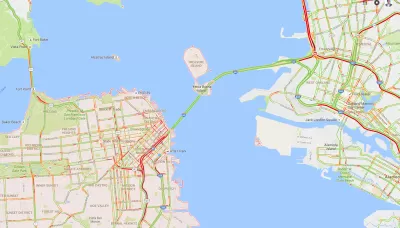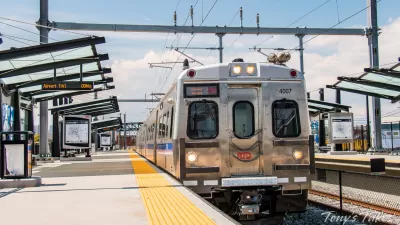The service would operate through Waze, and take a different approach than Uber or Lyft.

Since May, Google has been running a closed pilot in San Francisco for a rideshare service. It would take the form of a new feature in traffic app Waze, which Google purchased in 2013.
The program is oriented toward carpooling rather than chauffeuring.
This new service would be different from Uber and Lyft in that it would only try to connect people who are already going in the same direction, offering rates low enough to discourage drivers from operating like taxis.
Also, drivers would not be employed or even vetted by Google. As Ars Technia writes:
Those two issues—employment status and vetting of the drivers—have proved problematic for Uber and will likely cause legal and regulatory problems for Waze and Google as well.
FULL STORY: Google to undercut Uber in San Francisco with new ride-sharing service

Planetizen Federal Action Tracker
A weekly monitor of how Trump’s orders and actions are impacting planners and planning in America.

Maui's Vacation Rental Debate Turns Ugly
Verbal attacks, misinformation campaigns and fistfights plague a high-stakes debate to convert thousands of vacation rentals into long-term housing.

Restaurant Patios Were a Pandemic Win — Why Were They so Hard to Keep?
Social distancing requirements and changes in travel patterns prompted cities to pilot new uses for street and sidewalk space. Then it got complicated.

In California Battle of Housing vs. Environment, Housing Just Won
A new state law significantly limits the power of CEQA, an environmental review law that served as a powerful tool for blocking new development.

Boulder Eliminates Parking Minimums Citywide
Officials estimate the cost of building a single underground parking space at up to $100,000.

Orange County, Florida Adopts Largest US “Sprawl Repair” Code
The ‘Orange Code’ seeks to rectify decades of sprawl-inducing, car-oriented development.
Urban Design for Planners 1: Software Tools
This six-course series explores essential urban design concepts using open source software and equips planners with the tools they need to participate fully in the urban design process.
Planning for Universal Design
Learn the tools for implementing Universal Design in planning regulations.
Heyer Gruel & Associates PA
JM Goldson LLC
Custer County Colorado
City of Camden Redevelopment Agency
City of Astoria
Transportation Research & Education Center (TREC) at Portland State University
Jefferson Parish Government
Camden Redevelopment Agency
City of Claremont





























